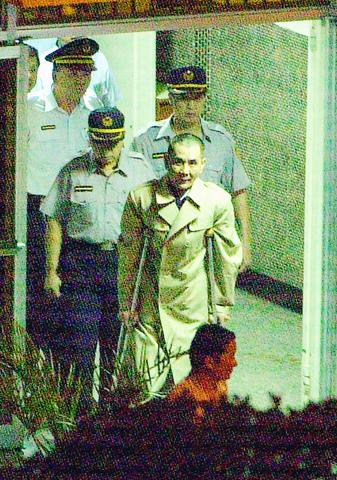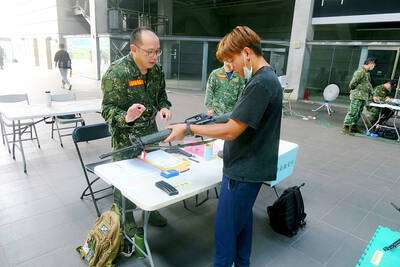In a sudden and unexpected development reminiscent of the decades of outright hostility between Taiwan and China, a Chinese man turned up last Monday on Taiwan's Tatan islet and claimed political asylum.
The man had traveled by train from China's northeastern Jilin Province to the southeastern port city of Xiamen, and then hired a fishing boat to take him to Taiwan. He jumped off the boat and swam to Tatan, not far from the Chinese coast, to ask the Taiwan government for political asylum.
Tang Yuanjun (唐元雋), 45, told soldiers on the islet that he was a "freedom seeker" and that he had been a devoted member of Chinese democracy movements during the 1980s and the early 1990s. He produced information that also showed he had been in jail for years and had been continually oppressed by Chinese authorities after his release.

TAIPEI TIMES FILE PHOTO
Tang was immediately taken into military custody and sent to the Prosecutors' Office in Kinmen for further questioning.
The event took place as a political storm was brewing in Taiwan about the possible defection to China of Wang Yi-hung (王宜宏), an army lieutenant, who is believed to have traveled to China via Thailand on Oct. 7.
Both incidents were a surprise in the current era of improved cross-strait exchanges, even if relations between Taiwan and its giant neighbor are far from cordial. Indeed, defections have been rare since the late 1980s when the liberalization of relations began in earnest.
"The public doesn't quite know what to make of the two incidents. `Freedom seeker' and `anti-communist patriot' are terms from the past," said Hsieh Shih-yuan (謝仕淵), a history Ph. D candidate who specializes in Taiwan history.
He said the incidents are surprising because most people had consigned the terms to history books on the Cold War era, when KMT-controlled Taiwan and Communist China competed to heap lavish rewards on defectors.
Unofficial statistics suggest that there were as many as 100 defections from China to Taiwan during the period from 1949 to the mid-1990s.
Between 1981 and 1987, at least 20 Chinese fighter pilots flew to South Korea before traveling to Taiwan where they were hailed as heroes.
"In the past, incentives provided by the KMT government were conducted for the purposes of propaganda aimed at the international community. The true motives of the `anti-communist patriots' were to avail themselves of the huge amounts of gold that the Taiwan government offered, rather than the pursuit of democracy and freedom," said Rick Chu (朱立熙), editor in chief of the Taipei Times.
Indeed, a number of examples of so-called "freedom seekers," leave a nasty taste in the mouth.
Defectors Zhuo Changren (卓長仁) and Jiang Hongjun (姜洪軍), were executed in Taipei on Aug. 10, last year, for a case of kidnapping and murder that they committed 10 years earlier out of greed.
The two, together with four other Chinese nationals had hijacked a Chinese passenger plane from China to South Korea in 1983 and came to Taiwan the following year. The day after their arrival in Taiwan, they were received by then president Chiang Ching-kuo (蔣經國) and were later awarded NT$17 million each for their "heroism."
After spending their rewards, however, the two found themselves in economic difficulties, prompting them to kidnap Wang Chun-chieh (王俊傑), the son of the assistant director of the Cathay General Hospital, Wang Yu-ming (王欲明), and demanded an NT$50 million ransom from his wealthy family. They panicked when the case became the center of media attention and they killed the hostage on Nov. 25, 1991.
The two were convicted of murder and kidnapping and sentenced to death. The sentences were only carried out after a 10-year-long appeals process, which many considered a face-saving effort by the Taiwan government after hailing as heroes such a dangerous pair of criminals.
Another example of a not-so-heroic defector is Lee Shien-pin (李顯斌). As an air force pilot, he defected to Taiwan on Nov. 11, 1965 in an IL-28 bomber, piloted by himself, from Hangchow, the capital of Chekiang Province, to Taoyuan with two other pilots ? Lee Chai-wang (李才旺) and Lien Pao-sheng (廉保生).
By the time the plane arrived in Taiwan, Lien, for reasons which have remained a mystery, was dead. Lee Chai-wang eventually went to the US, where he became a permanent resident in 1983.
Lee Shien-pin was rewarded with 3,500 ounces of gold. Lee Chai-wang received half that sum, and a further 1,750 ounces was reserved by the government for the family of Lien, should they choose to flee to Taiwan.
In 1991, Lee Shien-pin, however, apparently unsatisfied with the size of his reward, claimed that he had forced both Lee Chai-wang and Lien to come to Taiwan with him, so their 3,500 ounces of gold should belong to him. The defense ministry rejected his argument.
After enjoying a life of luxury in Taiwan, Lee suddenly went back to China in December 1991 where he was arrested immediately, before being sentenced to 15 years in jail for treason.
He was released on parole on May 13 this year because of serious stomach cancer. In an interview with Taiwanese reporters, however, he declined to talk about his political loyalties.
Taiwan's people were not impressed by the defectors' actions.
"I felt like I'd been cheated when I learned that these so-called heroes committed such crimes or eventually went back to China," said Lin Shu-feng (林淑鳳), a 26-year-old kindergarten teacher.
Lin said that, having grown up in an atmosphere of fierce patriotism, she had once felt that "freedom seekers" were brave and worthy of great respect, but she increasingly doubted this as she grew up.
"Now I think that the huge rewards were unnecessary because a normal life like those led by ordinary, free people in Taiwan would be the greatest possible reward for them if they truly wished to seek democracy and freedom," Lin said.
The end of confrontation between Taiwan and China perhaps puts a different perspective on such events.
"The glory days of defectors are over," said Hsieh the history student.
"Now we should see events of this kind from a different angle: depoliticize them and consider human rights," he said.

A magnitude 6.4 earthquake struck off the coast of Hualien County in eastern Taiwan at 7pm yesterday, the Central Weather Administration (CWA) said. The epicenter of the temblor was at sea, about 69.9km south of Hualien County Hall, at a depth of 30.9km, it said. There were no immediate reports of damage resulting from the quake. The earthquake’s intensity, which gauges the actual effect of a temblor, was highest in Taitung County’s Changbin Township (長濱), where it measured 5 on Taiwan’s seven-tier intensity scale. The quake also measured an intensity of 4 in Hualien, Nantou, Chiayi, Yunlin, Changhua and Miaoli counties, as well as

Credit departments of farmers’ and fishers’ associations blocked a total of more than NT$180 million (US$6.01 million) from being lost to scams last year, National Police Agency (NPA) data showed. The Agricultural Finance Agency (AFA) said last week that staff of farmers’ and fishers’ associations’ credit departments are required to implement fraud prevention measures when they serve clients at the counter. They would ask clients about personal financial management activities whenever they suspect there might be a fraud situation, and would immediately report the incident to local authorities, which would send police officers to the site to help, it said. NPA data showed

ENERGY RESILIENCE: Although Alaska is open for investments, Taiwan is sourcing its gas from the Middle East, and the sea routes carry risks, Ho Cheng-hui said US government officials’ high-profile reception of a Taiwanese representative at the Alaska Sustainable Energy Conference indicated the emergence of an Indo-Pacific energy resilience alliance, an academic said. Presidential Office Secretary-General Pan Men-an (潘孟安) attended the conference in Alaska on Thursday last week at the invitation of the US government. Pan visited oil and gas facilities with senior US officials, including US Secretary of the Interior Doug Burgum, US Secretary of Energy Chris Wright, Alaska Governor Mike Dunleavy and US Senator Daniel Sullivan. Pan attending the conference on behalf of President William Lai (賴清德) shows a significant elevation in diplomatic representation,

The Taipei City Reserve Command yesterday initiated its first-ever 14-day recall of some of the city’s civilian service reservists, who are to undergo additional training on top of refresher courses. The command said that it rented sites in Neihu District (內湖), including the Taipei Tennis Center, for the duration of the camp to optimize tactical positioning and accommodate the size of the battalion of reservists. A battalion is made up of four companies of more than 200 reservists each, it said. Aside from shooting drills at a range in New Taipei City’s Linkou District (林口), the remainder of the training would be at